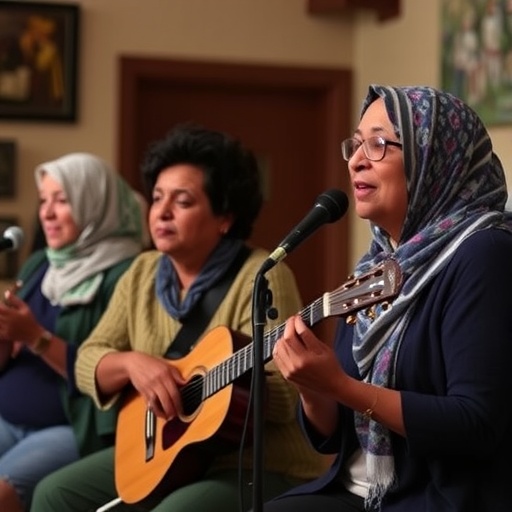
The role of music and singing as research methods to improve migrantsâ involvement in health research and policy-making has recently emerged as a compelling area of study. As the landscape of global migration evolves, health researchers are tasked with finding innovative ways to engage diverse populations and include their voices in the creation of health policies. Traditional methodologies often fail to resonate with migrant communities, leading to gaps in data and an underrepresentation of their unique experiences and needs. The incorporation of music and singing into research frameworks provides a transformative approach that not only celebrates cultural diversity but also fosters active participation and meaningful engagement in health research.
Music has served as a universal language throughout history, transcending geographic boundaries and cultural differences. It has the potential to evoke emotional responses, strengthen social bonds, and create a sense of belonging, making it an ideal tool for connecting with migrant communities. By integrating music into research, researchers can harness its emotional potency to break down barriers of mistrust that often exist between health authorities and marginalized populations. This approach not only facilitates communication but also nurtures an environment in which migrants feel empowered to share their health-related experiences and concerns.
Singing, in particular, can be a powerful vehicle for storytelling. Through song, individuals can express personal narratives that encapsulate their journeys, challenges, and aspirations. This mode of expression is particularly significant for migrants, many of whom may find it difficult to articulate their experiences in a new language or cultural context. By employing singing as a research method, researchers can tap into the rich tapestry of migrants’ lives, drawing out themes of resilience, hope, and community that might otherwise remain hidden in traditional evaluation methods.
In addition to enhancing personal narratives, the incorporation of music and singing can also create collaborative platforms for dialogue. Community-based participatory research (CBPR) models emphasize the importance of involving community members as equal partners in the research process. Music and singing can serve as the glue that binds researchers and migrant communities together, cultivating trust and fostering relationships that are critical to successful collaborations. When music is employed as a tool for engagement, it encourages reciprocal exchange, allowing researchers to learn from the rich cultural heritage of migrants while simultaneously imparting vital health information.
Moreover, music can help address cultural barriers that may hinder effective engagement in health research. For many migrants, navigating complex healthcare systems can be daunting, and cultural differences can exacerbate feelings of alienation. By leveraging music and singing, researchers can create an inviting atmosphere where cultural expression is not only welcomed but celebrated. This can lead to a greater understanding of the cultural nuances that shape migrantsâ health beliefs and practices, ultimately resulting in health policies that are more inclusive and tailored to the needs of diverse populations.
The role of music in health research extends beyond merely facilitating communication; it can also significantly enhance data collection efforts. Researchers can utilize musical activities as icebreakers or as part of focus groups, transforming traditional settings into engaging collaborative spaces. This innovative approach tends to yield richer qualitative data, as participants are more likely to open up and share candidly when they feel emotionally connected and engaged. The intertwining of art and research not only enriches the data collection process but also provides a refreshing avenue through which marginalized voices can resonate.
Furthermore, integrating music and singing into research methodologies has implications for health policy recommendations. By presenting findings through a musical lens, researchers can communicate insights in more relatable and digestible ways. Policymakers are often inundated with vast data sets, but the translation of intricate issues into the universal language of music can highlight key themes and concerns in a manner that is compelling and memorable. This approach ensures that the lived experiences of migrant communities are front and center in policy discussions and implementation frameworks.
One of the notable strengths of utilizing music as a research method is its capacity to transcend language barriers. Oftentimes, language limitations can prevent migrants from fully expressing their health-related concerns or from engaging in complex discussions about healthcare access. Music and singing not only provide an alternative means of expression but also allow for an emotional resonance that words alone may fail to capture. Researchers can encourage the production of original songs or adaptations of existing pieces to reflect the specific health challenges faced by migrant communities. This results in not just a richer data set but also one that authentically represents the voices of those who may feel unheard.
Engaging migrants through music can also serve an educational purpose. Workshops or community events that blend music with health education can effectively inform participants about health issues, preventive measures, and available services in an accessible format. By facilitating musical interactions, health researchers can promote health literacy while simultaneously encouraging community members to share their perspectives and insights. This dual approach is vital in creating a two-way dialogue that fosters mutual understanding and respect between health practitioners and migrant populations.
As the health landscape continues to evolve, researchers must remain adaptable and open to exploring alternative methodologies. The role of music and singing in health research presents an exciting frontier that promises to enrich our understanding of migrant populations and their health needs. By employing these methods, researchers can contribute to the creation of more inclusive health policies that acknowledge and honor the rich cultural tapestry of diverse communities. This is not merely about gathering data; it is about crafting a narrative that celebrates the resilience and strength of migrants as they navigate their health journeys in new and often challenging environments.
Ultimately, the use of music and singing as research methods stands to revolutionize the way health research is conducted. By prioritizing emotional resonance, collaborative dialogue, and cultural expression, researchers can bridge the gap between health authorities and migrant communities. In doing so, they foster an environment where everyone’s voice is heard, ensuring that health policies reflect the true needs and experiences of those they are meant to serve. As we move forward, it is crucial for the academic and health research communities to embrace innovative methods that not only prioritize data collection but also honor the humanity of all participants involved.
Through the lens of music, we can glimpse a future where health research not only informs policy but also weaves together the shared stories and experiences of migrants, leading to a more equitable and just healthcare landscape for all. As researchers explore the transformative power of music and singing, they not only push the boundaries of traditional research methodologies but also reaffirm the belief that creativity and innovation can foster meaningful change in health policy and practice.
This approach brings us closer to the ideal of a healthcare system that recognizes and addresses the unique needs of all populations, particularly those who have been traditionally marginalized. In a world where voices can often go unheard, music serves as a beacon of hope, ensuring that every story matters, and every voice contributes to the larger narrative of health and well-being.
Subject of Research: The role of music and singing as research methods to improve migrantsâ involvement in health research and policy-making.
Article Title: The role of music and singing as research methods to improve migrantsâ involvement in health research and policy-making.
Article References:
Phelan, H., Hassan, A. & MacFarlane, A. The role of music and singing as research methods to improve migrantsâ involvement in health research and policy-making.
Health Res Policy Sys 23, 67 (2025). https://doi.org/10.1186/s12961-025-01317-9
Image Credits: AI Generated
DOI:
Keywords: Music, Singing, Migrants, Health Research, Policy-Making, Community Engagement, Cultural Expression
Tags: barriers in health research for migrantscultural diversity in health researchemotional connection through musicempowering migrant voices in health policyenhancing migrant health participationfostering trust in health researchinnovative engagement strategies for migrantsmigrant experiences in health systemsmusic and emotional well-being in researchmusic as a research methodmusic’s role in community buildingtransformative approaches in health research




